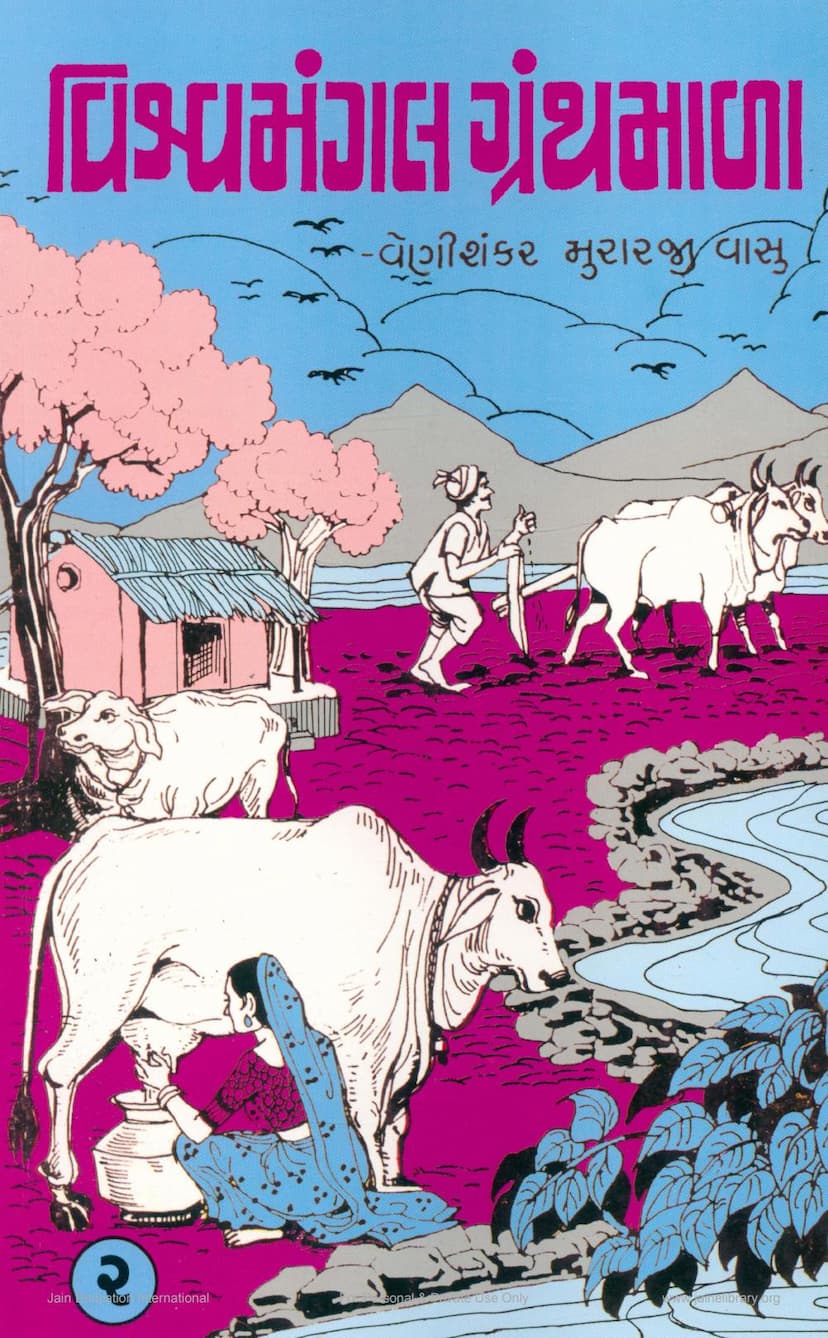Vishvamangal Granthmala Part 02
Added to library: September 2, 2025

Summary
Here's a comprehensive summary of the provided Jain text, "Vishvamangal Granthmala Part 02" by Veishankar Murarji Vasu, focusing on its core arguments and themes:
Overall Theme: The book is a strong critique of Western-influenced economic and societal systems imposed on India, arguing that they have led to the degradation of Indian culture, economy, and the well-being of its people. The author advocates for a return to traditional Indian, specifically Jain-influenced, values and practices for national prosperity and spiritual upliftment.
Key Arguments and Themes:
- Critique of Western Economic Models: The central argument is that the Western economic system, characterized by "Shoshak Arthavyavastha" (exploitative economy) and reliance on machinery ("Yantra"), is inherently destructive. It prioritizes profit and exploitation over life, nature, and human well-being. This is contrasted with the "Bharatiya Arthavyavastha" (Indian economy), which is based on "Gauraksha" (cow protection), "Vanaraksha" (forest protection), "Bhuraksha" (soil protection), and "Jalaraksha" (water protection). This traditional system is depicted as life-sustaining, decentralized, and centered on human and animal power.
- Destruction of Indian Industries and Livelihoods: The book details how British policies, continued by post-independence governments influenced by Western models, systematically destroyed India's indigenous industries like handloom weaving and traditional craftsmanship. The author argues that this led to widespread unemployment, poverty, and migration to cities, exacerbating social problems.
- The Role of the "Deshi Angrez" (Indianised Englishmen): The author is highly critical of educated Indians who, influenced by Western education, have become "agents" of Western destruction. These individuals, with their degrees and Westernized outlook, are seen as actively dismantling Indian culture and values, often unknowingly, by promoting Western ideals and practices.
- Critique of Modern Agriculture and Fertilizers: The book strongly condemns the use of chemical fertilizers and tractors, arguing they damage soil fertility, increase costs, and make farmers dependent on external inputs. The author champions the use of cow dung as natural fertilizer, emphasizing its ecological and economic benefits for restoring soil health and reducing poverty.
- The Importance of Cow Protection (Gauraksha): The cow is presented as central to the Indian economy and way of life. The destruction of cattle through slaughter and export is blamed for a myriad of problems, including unemployment (especially for Harijans), scarcity of milk and fertilizer, increased agricultural costs, and the spread of diseases. The author advocates for complete prohibition of cow slaughter.
- Debunking False History: The text challenges the Western-influenced historical narrative that portrays ancient Indians as primitive or uncivilized. It asserts that India had a rich, advanced civilization with sophisticated knowledge in various fields, and that the British deliberately propagated false history to undermine Indian pride and self-reliance.
- Critique of Modern Education: The prevailing education system is criticized for alienating youth from their own culture, history, and values, leading them to blindly imitate the West and devalue their own heritage.
- The "Protein" Propaganda: The author identifies the promotion of "protein" through eggs, meat, and fish as a deliberate conspiracy to make Indians non-vegetarian, thereby weakening their spiritual and cultural foundation and making them susceptible to conversion to other religions. The sanctity and nutritional value of pure cow's milk and ghee are highly praised.
- Critique of Modern Societal Ills: The book links many modern societal problems – corruption, unemployment, poverty, disease, environmental pollution, and moral decay – directly to the adoption of the Western, materialistic, and exploitative worldview.
- Call for Return to Indian Values: The ultimate solution proposed is a return to the core principles of Indian civilization, emphasizing "Moksha-lakshi Sanskriti" (salvation-oriented culture), non-violence (Ahimsa), simplicity, self-reliance, and the ethical use of resources, particularly the cow and its products. The author urges people to reawaken their pride in their heritage and actively work towards restoring the traditional Indian economic and social order.
Specific Chapters/Themes Highlighted (based on the provided table of contents and text):
- Machine-based vs. Animal-based Economy: A stark contrast is drawn between the exploitative, machine-driven Western economy and the life-sustaining, animal-powered Indian economy.
- False History Propagated by the British: The book aims to expose and correct the historical narrative presented by the British, which it claims misrepresented Indian achievements and character.
- The Impact of Western Policies on Various Castes/Communities: The text discusses how the British policies negatively impacted not only the economy but also specific communities like Harijans (through the destruction of the leather industry) and Kshatriyas (through the disruption of agriculture due to cattle slaughter).
- The Deception of "Protein": The author meticulously argues that the emphasis on "protein" through non-vegetarian food is a calculated move to undermine Indian culture and dietary practices.
- The Danger of Fertilizers: The widespread use of chemical fertilizers is blamed for depleting soil health, increasing costs, and making farmers dependent on external sources, further contributing to the nation's economic vulnerability.
- The Problem of Harijans: The book views the "Harijan problem" as a symptom of deeper societal ills caused by the breakdown of traditional systems and discriminatory policies, rather than an inherent issue within the caste structure itself. It advocates for restoring their traditional occupations and economic independence.
- The Corruption of Language and Concepts: The author points out how Western concepts like "industry," "development," and "nutrition" have been twisted to serve exploitative agendas, masking the destructive nature of the imposed systems.
In essence, "Vishvamangal Granthmala Part 02" is a passionate and detailed indictment of Western influence on India, calling for a fundamental shift back to the principles of Indian civilization, particularly those rooted in Jain and Vedic traditions, as the path to true prosperity and well-being.